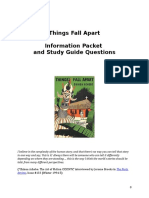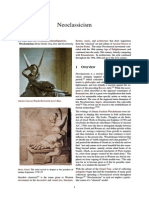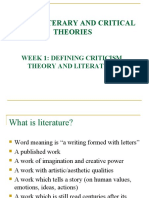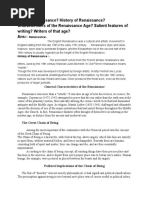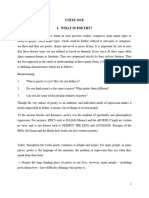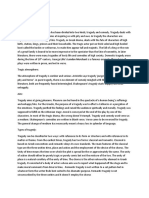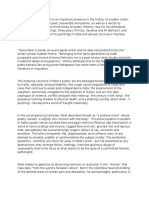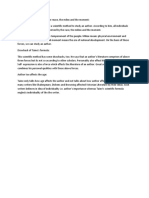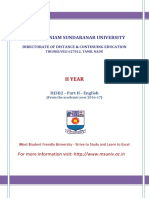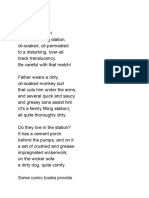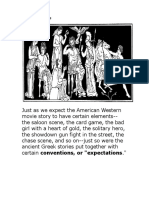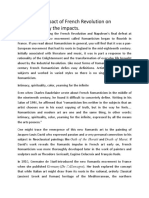Prose Drama vs. Poetic Drama
Prose Drama vs. Poetic Drama
Uploaded by
Clarie Jane IhingCopyright:
Available Formats
Prose Drama vs. Poetic Drama
Prose Drama vs. Poetic Drama
Uploaded by
Clarie Jane IhingCopyright
Available Formats
Share this document
Did you find this document useful?
Is this content inappropriate?
Copyright:
Available Formats
Prose Drama vs. Poetic Drama
Prose Drama vs. Poetic Drama
Uploaded by
Clarie Jane IhingCopyright:
Available Formats
Prose Drama vs.
Poetic Drama
Exploring the Dichotomy and Characteristics
Introduction
Drama is a versatile genre encompassing various forms and styles.
Prose and poetic drama are two primary categories that differ in structure, language, and
presentation.
In this presentation, we will delve into the characteristics, types, examples, and
dichotomy of prose and poetic drama.
Prose Drama
Characteristics
Language: Written in ordinary language, resembling everyday speech.
Structure: Follows a natural flow with minimal or no specific rhyme or meter.
Realism: Often focuses on realistic portrayal of characters and situations.
Versatility: Allows for diverse themes and settings.
Types of Prose Drama
1. Naturalistic Drama: Emphasizes detailed realism and often explores darker aspects of
life.
Example: Henrik Ibsen's "A Doll's House."
2. Comedy of Manners: Satirical and witty, highlighting the foibles of high society.
Example: Oscar Wilde's "The Importance of Being Earnest."
3. Domestic Drama: Focuses on family life, relationships, and domestic issues.
Example: Tennessee Williams' "A Streetcar Named Desire."
4. Absurdist Drama: Often characterized by surreal and illogical elements, focusing on the
meaninglessness of human existence.
Example: Samuel Beckett's "Waiting for Godot."
5. Farce: Emphasizes humor, physical comedy, and absurd situations, often involving
mistaken identities and misunderstandings.
Georges Feydeau's "A Flea in Her Ear."
6. Tragicomedy: Blends elements of tragedy and comedy, offering a mix of humor and
serious themes.
Tom Stoppard's "Rosencrantz and Guildenstern Are Dead."
7. Political Drama: Explores political themes, power struggles, and social issues.
Example: Bertolt Brecht's "The Threepenny Opera."
8. Historical Drama: Set in a specific historical period, often featuring real historical figures
and events.
Example: Friedrich Schiller's "Mary Stuart."
9. Melodrama: Exaggerated emotions, clear moral conflicts, and often featuring virtuous
heroes and evil villains.
Example: Victor Hugo's "Les Misérables."
10. Psychological Drama: Explores the inner workings of the human mind and emotions,
often delving into complex psychological states.
Example: Henrik Ibsen's "Ghosts."
Poetic Drama
Characteristics
Language: Utilizes heightened, lyrical language with rhyme, rhythm, and meter.
Structure: Often adheres to specific poetic forms (e.g., blank verse, rhymed couplets).
Symbolism: Symbolic and allegorical elements may be prevalent.
Elevated Themes: Tends to explore profound, philosophical, or mythological subjects.
Types of Poetic Drama
1. Tragedy: Explores the downfall of a central character due to their own flaws or external
forces.
Example: Shakespeare's "Macbeth."
2. Comedy: Uplifting and humorous, typically ending with reconciliation and harmony.
Example: Shakespeare's "A Midsummer Night's Dream."
3. History Play: Depicts historical events or figures in poetic form.
Example: Shakespeare's "Henry IV."
4. Epic Theatre: Developed by Bertolt Brecht, it emphasizes critical and didactic elements
to provoke thought and reflection in the audience.
Brecht's "Mother Courage and Her Children."
5. Symbolist Drama: Symbolism is a key feature, with an emphasis on dreamlike,
allegorical narratives.
Maurice Maeterlinck's "Pelléas et Mélisande."
6. Verse Drama: Written entirely in verse, often adhering to specific poetic forms.
Christopher Marlowe's "Doctor Faustus."
7. Romantic Drama: Explores themes of love, passion, and idealism with a focus on
emotional intensity.
Lord Byron's "Manfred."
8. Expressionist Drama: Emphasizes the emotional and psychological experiences of
characters, often using distorted and abstract techniques.
Georg Kaiser's "From Morn to Midnight."
9. Surrealist Drama: Influenced by the Surrealist movement, it often features dreamlike and
irrational elements.
Antonin Artaud's "The Cenci."
10. Metaphysical Drama: Explores philosophical and metaphysical themes, often employing
complex symbolism and allegory.
T.S. Eliot's "The Cocktail Party."
Dichotomy: Prose vs. Poetry
Dichotomy
Language: Highlight the difference in language styles.
Poetic drama uses verse and artistic language.
Prose Drama uses everyday language. * no poetic elements
Structure: Explain how they differ in terms of structure and use of verse.
Prose Drama: Typically employs sentences and paragraphs for dialogue
and narrative, resembling regular conversational language.
Poetic Drama: Often incorporates stanzas, verse, and poetic elements in
the dialogue and structure, creating a more rhythmic and stylized form of
expression.
Influence and Evolution
Classical Greek Drama: Often written in poetic form (e.g., Sophocles' tragedies).
Shakespearean Drama: Masterfully blended prose and poetry.
Modern Theatre: A mix of both forms, with experimentation and innovation.
Conclusion
Prose and poetic drama offer distinct experiences and storytelling approaches.
Both have evolved over time and continue to influence contemporary theater.
Understanding their characteristics and dichotomy enriches our appreciation of dramatic
literature.
You might also like
- Things Fall Apart Information Packet and Study Guide QuestionsDocument19 pagesThings Fall Apart Information Packet and Study Guide QuestionsSydney McNeilNo ratings yet
- What Is A MetaphysicalDocument3 pagesWhat Is A MetaphysicalDebasis DangarNo ratings yet
- Neo ClassicismDocument13 pagesNeo ClassicismJason TiongcoNo ratings yet
- What Is PoetryDocument4 pagesWhat Is PoetryLegends FunanzaNo ratings yet
- DF As A Morality PlayDocument3 pagesDF As A Morality Playenglish botanyNo ratings yet
- History of TragedyDocument2 pagesHistory of TragedywatankhanNo ratings yet
- Describe The Main Plot and Sub Plots, As Brought Out in The FirstDocument2 pagesDescribe The Main Plot and Sub Plots, As Brought Out in The FirstVarun BaliNo ratings yet
- Hellenism in Keats' Poetry With Special References To The Poems That You Have Read in Your SyllabusDocument4 pagesHellenism in Keats' Poetry With Special References To The Poems That You Have Read in Your SyllabusSAHIN AKHTAR100% (1)
- DramaDocument10 pagesDramaMeshu QadirNo ratings yet
- Tragic ComedyDocument4 pagesTragic ComedyRizki Fajar Ko100% (1)
- Defining Criticism, Theory and LiteratureDocument20 pagesDefining Criticism, Theory and LiteratureSaravana SelvakumarNo ratings yet
- Literature: Origin of Literature Define Literature Basics Types of LiteratureDocument5 pagesLiterature: Origin of Literature Define Literature Basics Types of LiteratureTahir BukhariNo ratings yet
- Renaissance AgeDocument17 pagesRenaissance AgeAnum MubasharNo ratings yet
- In A GroveDocument4 pagesIn A Grovejennjoseph22No ratings yet
- Analysis of Sonnet 30Document1 pageAnalysis of Sonnet 30Katelin LucineNo ratings yet
- EnglishDocument19 pagesEnglishTesfu HettoNo ratings yet
- Modern English Drama 2024 DR RafeaDocument6 pagesModern English Drama 2024 DR Rafeazyzz3690No ratings yet
- Prose Definition of ProseDocument1 pageProse Definition of ProseCher LozadaNo ratings yet
- Myth and LiteratureDocument5 pagesMyth and LiteratureNaman BansalNo ratings yet
- TragedyDocument3 pagesTragedySONA100% (1)
- Dramatic Poetry in Doctor FaustusDocument9 pagesDramatic Poetry in Doctor FaustustigerpiecesNo ratings yet
- Literary Characteristics of Puritan AgeDocument16 pagesLiterary Characteristics of Puritan AgeMaria Rani100% (1)
- William Shakespeare: Brief IntroductionDocument30 pagesWilliam Shakespeare: Brief IntroductionNajd MhammdNo ratings yet
- Multilingual Vs Bilingual MT Systems.Document11 pagesMultilingual Vs Bilingual MT Systems.NatalieNo ratings yet
- Definition of LitertaureDocument4 pagesDefinition of LitertaureEdsel AlapagNo ratings yet
- The AlchemistDocument5 pagesThe AlchemistprizcnuNo ratings yet
- Military Register1 PBDocument13 pagesMilitary Register1 PBIgwe ChrisNo ratings yet
- Gieve PatelDocument3 pagesGieve PatelSoma BiswasNo ratings yet
- Taine's FormulaDocument1 pageTaine's Formulajunaid ashrafNo ratings yet
- Development of English DramaDocument4 pagesDevelopment of English DramaRangothri Sreenivasa Subramanyam0% (1)
- Cannonization IntroDocument42 pagesCannonization IntroamitendubanerjeeoNo ratings yet
- Verbal and Nonverbal CommunicationDocument3 pagesVerbal and Nonverbal Communicationsahsaan YT Free fire king100% (1)
- Indian JugglersDocument13 pagesIndian JugglersAnjali ShrivastavaNo ratings yet
- Classics in Drama: Art and Artifice of Shakespearean TragedyDocument10 pagesClassics in Drama: Art and Artifice of Shakespearean TragedyMuhammad Hashir Aziz100% (1)
- Buttoo, Dhruva, Sindhu, "Sita" and "Prahlad". Besides These She Also Wrote Seven NonDocument7 pagesButtoo, Dhruva, Sindhu, "Sita" and "Prahlad". Besides These She Also Wrote Seven Nonanon_59951004No ratings yet
- English 2019 Model QuestionsDocument11 pagesEnglish 2019 Model QuestionsZirconPattnaik100% (1)
- NTA NET Solved English Question PaperDocument14 pagesNTA NET Solved English Question PaperVaibhavPathakNo ratings yet
- Manonmaniam Sundaranar University: Ii YearDocument54 pagesManonmaniam Sundaranar University: Ii YearKaruppannanmariappancollege KmcNo ratings yet
- Filling Station - Elizabeth BishopDocument14 pagesFilling Station - Elizabeth BishopTadhg MccarthyNo ratings yet
- 212-Allied - III - Literary Forms-Types of Drama - Tragedy and ComedyDocument6 pages212-Allied - III - Literary Forms-Types of Drama - Tragedy and ComedyJ JosephineNo ratings yet
- Topic: Sir Philip Sidney: (An Apology For Poetry)Document9 pagesTopic: Sir Philip Sidney: (An Apology For Poetry)Shouban JatoiNo ratings yet
- Descriptive and Prescriptive Approach: Group 4Document9 pagesDescriptive and Prescriptive Approach: Group 4Rismalina AyundaNo ratings yet
- Forms of DramaDocument2 pagesForms of Dramaarshad tararNo ratings yet
- Characteristic of TragedyDocument5 pagesCharacteristic of Tragedyrathodvruti83No ratings yet
- Theory of TragedyDocument5 pagesTheory of TragedyLukania BoazNo ratings yet
- Epic ConventionsDocument7 pagesEpic Conventionskamran imtiaz100% (1)
- Corruption and Environmental Pollution: A Critique of Gabriel Okara's The VoiceDocument6 pagesCorruption and Environmental Pollution: A Critique of Gabriel Okara's The VoiceIJELS Research JournalNo ratings yet
- UG Semester III English LanguageDocument2 pagesUG Semester III English LanguageBILYANSIDHA PAYAGONDENo ratings yet
- Origin of DramaDocument5 pagesOrigin of DramaAnnslette Maria Victoria SimendyNo ratings yet
- Black Hermit AnalysisDocument7 pagesBlack Hermit Analysispeterita989No ratings yet
- Kelompok 7 - Text-Oriented ApproachDocument2 pagesKelompok 7 - Text-Oriented ApproachFebrian SeaveyNo ratings yet
- What Is LiteratureDocument4 pagesWhat Is LiteratureIrish100% (2)
- CBCS Paper 4Document31 pagesCBCS Paper 4POLASH BHUYAN JNV TITABOR50% (2)
- (English) History of Drama Dramatic Movements and Time Periods (DownSub - Com)Document3 pages(English) History of Drama Dramatic Movements and Time Periods (DownSub - Com)Rafi Sahar100% (1)
- Shakespeares Plays Study QuestionsDocument6 pagesShakespeares Plays Study QuestionsMirela Strajeriu HrimiucNo ratings yet
- The RivalsDocument14 pagesThe RivalsGulunu KhanNo ratings yet
- What Is ComedyDocument9 pagesWhat Is Comedyadeebas055100% (1)
- Bla 4214 - PoetryDocument61 pagesBla 4214 - PoetryGodwin Kipkirui NgetichNo ratings yet
- METAPHYSICAL POETRY A SummaryDocument3 pagesMETAPHYSICAL POETRY A Summaryrcschoolofenglish1No ratings yet
- Verse and DramaDocument25 pagesVerse and DramaMuhammedNo ratings yet
- PR Map A eDocument24 pagesPR Map A ezozomaherNo ratings yet
- MES Bags Overall Champion in The 2024 CD3 JournalimpicsDocument2 pagesMES Bags Overall Champion in The 2024 CD3 JournalimpicsMaria Danica UangagNo ratings yet
- Plan Exhibition Ta-114Document6 pagesPlan Exhibition Ta-114Ayana MoonNo ratings yet
- Contemporary ARTS 11-4th Q PDFDocument32 pagesContemporary ARTS 11-4th Q PDFMya Jane Oliva100% (1)
- Baroque Art 1600 1800Document27 pagesBaroque Art 1600 1800John Lawrence KiniadoNo ratings yet
- GEC16 UNIT1 Lesson5 PDFDocument59 pagesGEC16 UNIT1 Lesson5 PDFRaemann Zaira FernandezNo ratings yet
- Arts Appreciation PresentationDocument12 pagesArts Appreciation PresentationRichele R. ValenciaNo ratings yet
- Shades of ClayDocument4 pagesShades of ClayCenuta1No ratings yet
- Method and Material PTG PapersDocument5 pagesMethod and Material PTG Papersteerprug1212No ratings yet
- Discuss The Impact of French Revolution On RomanticsDocument4 pagesDiscuss The Impact of French Revolution On RomanticsFaisal GhousNo ratings yet
- Perspective DrawingsDocument68 pagesPerspective DrawingsKapil AroraNo ratings yet
- easy object drawing pencil shading - Google SearchDocument1 pageeasy object drawing pencil shading - Google SearchSamaira SavlaNo ratings yet
- Arts AppreciationDocument14 pagesArts AppreciationRechie MarucotNo ratings yet
- DANCE - ARTS 1100 Module 2Document19 pagesDANCE - ARTS 1100 Module 2fiona abenojaNo ratings yet
- Orchids - Hazel Simmonds - MC Donald (ST Lucia)Document4 pagesOrchids - Hazel Simmonds - MC Donald (ST Lucia)Ariana EmmanuelNo ratings yet
- Discipline-Based Art EducationDocument11 pagesDiscipline-Based Art EducationRuby Jane DuradoNo ratings yet
- Music 190089181 Patronage System in The Baroque and Classical Periods 2 Turabia 10 PagesDocument12 pagesMusic 190089181 Patronage System in The Baroque and Classical Periods 2 Turabia 10 Pagesapi-362008658No ratings yet
- PE3 PPT Module 1-3-25Document23 pagesPE3 PPT Module 1-3-25Elle HeartfiliaNo ratings yet
- Girly Girl - Rania Aly - Hana Doll - English 1Document18 pagesGirly Girl - Rania Aly - Hana Doll - English 1Melanie Manriquez100% (6)
- Personal Art Criticism WorksheetDocument3 pagesPersonal Art Criticism Worksheetapi-310282544100% (1)
- Art QuotesDocument3 pagesArt Quotesmaa siddhiNo ratings yet
- 'The Invisble Art' ReviewDocument3 pages'The Invisble Art' ReviewHarryNo ratings yet
- Tarsila Do Amaral-Inventing Modern Art in BrazilDocument11 pagesTarsila Do Amaral-Inventing Modern Art in BrazilSimon AltkornNo ratings yet
- Divali 2014Document68 pagesDivali 2014Kumar MahabirNo ratings yet
- Application Form NKD 2021Document2 pagesApplication Form NKD 2021Alexei MarcoviciNo ratings yet
- History and Theory Draft Exam Questions PDFDocument27 pagesHistory and Theory Draft Exam Questions PDFNoodle HeafNo ratings yet
- Q2 Grade 8 Music M1Document48 pagesQ2 Grade 8 Music M1mngasmen7No ratings yet
- It's All About That DANCE: The D AnceDocument3 pagesIt's All About That DANCE: The D AnceRyzza Yvonne MedalleNo ratings yet
- An Introduction To Design Thinking: Corey Ford Cford@stanford - EduDocument34 pagesAn Introduction To Design Thinking: Corey Ford Cford@stanford - EduTroy Rowe BrownNo ratings yet
